- Home
- Terri Blackstock
Emerald Windows Page 3
Emerald Windows Read online
Page 3
“Well, it’d better be good to keep your old man waiting.”
Tell them now, Brooke told herself. Get it over with, so you can relax and enjoy the rest of the night. Brooke’s throat constricted suddenly, and she opened her mouth to tell them about the renovation and the windows and Nick. “I had to—”
The sound of footsteps cut her off, and she turned to see her sister, Roxy, leaning in the doorway, watching the homecoming with an expressionless face. Her baby-blond hair was pulled up in a clip, and loose curls trailed down her back. Her eyes, an almost bronze color that Brooke had never seen on anyone else, seemed distant and guarded. Brooke had begun to notice a change in her sister a couple of years before, during the family’s visits in Columbia.
“She’s just preoccupied with her job at city hall,” her mother had said, trying to explain Roxy’s aloofness. Or, “She’s got that artist’s temperament like you had. Her dancing is about all she cares about.” But Brooke had sensed that there was something more in the strain etched on her sister’s face and the distance she’d put between them.
“Roxy.” Brooke reached for her sister and pulled the stiff young woman into a one-sided hug. Roxy’s subtle resistance instantly confirmed that all was not well. Brooke released her and saw that, while Roxy did smile, it didn’t appear to be without effort. “Hi, Brooke,” she said quietly.
Brooke peered into her eyes, searching for a clue as to what was wrong. “Are you okay?” she asked.
“Sure,” Roxy said. “Fine.”
Brooke dropped her hands.
Her mother stepped between them before Brooke could analyze her sister’s mood further, guiding them both into the kitchen. “I’ve kept dinner warm for you, Brooke,” she said. “So, tell us. What in the world finally convinced you that you wouldn’t turn into a pillar of salt if you came home?”
Brooke watched her mother bustle around the stove filling the plates…her father, easing into his designated place at the head of the table…her sister, still standing slightly away from the table, waiting with grudging interest for Brooke’s answer.
“It’s a commission,” Brooke said. “I had an offer to do the stained-glass windows at St. Mary’s. Hayden Bible Church bought the building, and they’re renovating—”
Her mother swung around, astounded as she regarded her daughter. “You mean, they asked you to do it?” A slow smile spread across her face as she met her husband’s eyes.
“Of course they asked,” George replied with a characteristic chuckle, puffing up as if the townspeople assigned his daughter to every important job that came along. “Our little girl designs the best windows in the hemisphere. Who else would they have asked?”
“Well, the church members aren’t really the ones who picked me,” Brooke said tentatively.
Her mother brought two of the plates to the table and set them on their place mats, still listening intently.
“In fact,” Brooke went on, “I’m not even sure they know that I was chosen.”
Her mother went back for the other two plates, and Roxy sat down. “Then who hired you?” her mother asked.
Brooke stared down at her plate, wishing some miracle would occur to wipe the subject from their minds. They hadn’t discussed Nick Marcello in all these years. Why did they have to do it now? She took a deep breath and told herself there was no way to avoid it. “Nick Marcello asked me,” she whispered.
Her mother dropped the fork she had just lifted, and it landed on her plate with a loud clatter. Her father didn’t move a muscle, but his face hardened to a colorless granite. Even Roxy’s eyes seemed to dull in consternation as she stared at the iced tea beside her plate.
“What in the Sam Hill has Nick Marcello got to do with it?” her father bit out.
Brooke met her father’s eyes and swallowed hard. “He’s in charge of artistic development for the renovation.” She turned to her mother, saw that the same expression had altered her face as well. “Mom, I haven’t agreed to take the job yet. I didn’t even know he was involved until I got into town today, and when I saw him this afternoon, I told him that I’d have to think about it.”
“Think about it?” her mother repeated. “You actually have to think about it? After all that’s happened? After all he’s put us through?”
“Don’t even think about starting that up again, Brooke,” her father said.
Brooke took a deep breath and warned herself that losing her temper would serve no purpose. “Dad, nothing is starting up again. I’m not going to embarrass anybody. I was interested in the job because it’s a fantastic career opportunity. My boss, Mr. Gonzales, strongly encouraged me to do it. That’s absolutely the only reason.”
Her mother leaned toward her in disbelief. “You can’t be considering taking this job, Brooke.” The statement sounded too much like an order, and Brooke’s white-knuckled fingers clamped more tightly over the edges of her chair.
“Mom, a job like this could really launch my career. It’s the kind of thing stained-glass artists work toward all their lives. That has to be considered.”
“She’s going to take the job,” her mother uttered, shooting a glance back to her father. “She’s going to work with him, and it’ll all start up again.”
“Nothing is going to start up!” Brooke said. “I’m a grown woman now, and he’s not my teacher anymore. We aren’t involved or even interested in each other, and we never have been. Don’t you think, after seven years, I ought to have the chance to work in my home town, holding my head up? Haven’t I earned that?”
“That’s not something you can earn,” her father said. “Once your reputation is taken away from you, you can’t get it back.”
“Dad, that isn’t—”
“Just eat,” her mother blurted out, her eyes misting with anger. “It’s been sitting long enough. We’ll talk about this later.”
Roxy’s chair scraped back from the table and she got to her feet. “I’m not hungry,” she said. And before anyone could protest, she left the table.
CHAPTER
THE REMAINDER OF THE MEAL WAS short and stressfully quiet, and Brooke managed to choke down at least half of the dinner that had once been her favorite. She told herself she wouldn’t cry and wouldn’t engage in a screaming argument with her father and mother, like the one she’d had when she was eighteen.
Without a word she helped her mother clear the table, then went to look for Roxy. What was bothering her? Surely not the thing with Nick, Brooke thought. Roxy had been too young to understand when the scandal erupted. Still, Roxy’s aloofness troubled her.
She knocked on her sister’s bedroom door, and at Roxy’s uttered “What?” opened it and stepped inside. Roxy was sitting on the wide bench in front of her window, hugging her knees to her chest.
Brooke looked around the small room that revealed the stages of Roxy’s growth: a tattered teddy bear on a shelf next to several ballet trophies, a framed photo of her dancing in The Nutcracker, a stack of books on a table ranging from Shakespeare to Pat Conroy, a pair of toe shoes hanging from a hook on the wall. She looked at her sister, wishing that words came more easily and that she knew how to dispense with the awkwardness between them. “Sorry about the scene at the table,” Brooke said.
Roxy’s gaze drifted out the window. “What did you expect?”
Brooke set a hand on the bedpost. “I don’t know. I guess I’d hoped that after seven years it would die down a little. At least among my family. I keep thinking enough time has passed. That we could talk about it…make some sense of it all.”
Roxy didn’t answer. Instead she kept her eyes fixed on some invisible object outside the window.
Brooke sighed. “I like your room,” she said, trying to find some common ground. “The last time I was in here, you were mostly into Little Mermaid.” She smiled and stepped over to the stereo system, sitting on a cabinet in the corner. “You had this little plastic tape player with a picture of Donald Duck on the top, and you listened to Sesame Street
records all the time and made up little dances to them.”
“I don’t dance anymore,” Roxy said.
Brooke turned back to her. “Why? You were good.”
Roxy laughed mirthlessly. “How would you know? You never saw me dance. Not since I was ten.”
“No, but Mom told me you were the soloist in the ballet company, and that—”
“I quit.” Roxy left the window and lifted her toe shoes off their hook. She looked down at them, holding them with a reverence that didn’t match the lack of interest in her voice.
Brooke knew she was pushing too hard, but she couldn’t keep from asking, “Well, why?”
“Because I got tired of it,” Roxy said. “Why the sudden interest?”
Brooke’s quiet laugh held no amusement. “Because you’re my sister.”
Roxy brought her eyes to Brooke’s, disgust and resentment narrowing them. “I graduate from high school in June, Brooke. But you probably didn’t know that, either, did you?”
Brooke’s forced smile faded, and she braced herself for whatever was coming. “Of course I know. What are you talking about?”
“I’m talking about the fact that I grew up while you were off running from your problems.”
Brooke lowered herself to her sister’s bed and settled her eyes on Roxy, suddenly aware that the coolness Roxy had displayed earlier had roots much deeper than awkward shyness. “What’s the matter, Roxy?” she asked quietly. “Why are you mad at me? Is it Nick?”
Roxy laughed, a sound so cold and heartless that it made Brooke shiver. “Is it Nick?” she repeated harshly. “Hasn’t it always been Nick, Brooke? For you, for our family, for me?”
Brooke’s patience stretched taut at the vague accusation. She hadn’t expected this from Roxy. Emotion welled in her throat, making her voice wobble. “It didn’t happen to you, Roxy. It happened to me. You were little, and you probably have no idea what I went through back then. But don’t judge me for staying away when you don’t know how I felt.”
Roxy’s eyes were two golden flames dancing with fury as she faced her sister. “You’ve got a lot of nerve, you know that? Do you think it only affected you? You made headlines in the newspaper, Brooke! I may have been ten years old, but I could read! And if I hadn’t, it wouldn’t have mattered because everyone else in town was there to tell me about it!”
The outburst made Brooke’s face burn. “I’m sorry that you were hurt by it,” she said, tears coming to her eyes though she spoke through clenched teeth. “It hurt all of us.”
“It didn’t hurt you,” Roxy charged. “You didn’t have to face it. You disappeared, remember? I’m the one who had to sit in class and listen to my teachers whisper about you when they thought I didn’t know what they were talking about. I’m the one who got in fights with the kids at school because they made fun of me for being your sister. For over half my life, I’ve been known as the sister of that girl who had an affair with her teacher! There’s not a lot to talk about in Hayden, Brooke. They milked that scandal for all it was worth.”
Anger pulsated through Brooke’s veins, and one hot tear fell onto her cheek. “I didn’t have an affair with him, Roxy,” she said, clipping each word. “I didn’t even kiss him. It was all a lie.”
“Not according to the Hemphills,” Roxy reminded her. “They set the truths in this town, and they’re still here. He’s still running the school system, and she’s still on the town council, and they still own half the town. Their children are grown, following in the family tradition. And when they hear that you’ve come back here to work with him…it’s going to start all over!”
Brooke lifted her chin defiantly, and her words came slowly, quietly, through her teeth. “I won’t let them dictate my life anymore, Roxy. I’m tired of trying to redeem myself from a bunch of lies.”
“Redeem yourself?” Roxy cried. “What have you done to redeem yourself? I’m the one who’s tried to redeem you!”
Brooke’s tears stole down her face, but she held her posture defiantly stiff, determined not to collapse under the weight being set upon her shoulders. “I’m sorry I hurt you,” she whispered.
“It’s too late for apologies,” Roxy said, the finality in her tone bolting the door to whatever relationship they might have had. “About seven years too late.”
Brooke bit her quivering lip, for there was nothing left to say. Finally she pulled herself together enough to leave the room. The loss hit Brooke like the death of someone she had cherished, but she managed to keep the pain from her face until she was hidden in her room, where no one else could see.
Brooke had learned long ago to deal with her pain alone.
She lay on the bed in the bedroom that had been converted into a cold, impersonal guest room. Had this really been her home? The architecture was unaltered, but nothing looked the same…and in her soul she could feel the difference, as if she’d been transported back into the wrong family.
She rolled onto her back and looked at the ceiling where long ago she had painted a blue sky and clouds so vivid that one would have thought she was sleeping outside. Roxy used to sneak into her bed at night after their parents were asleep, declaring that she couldn’t sleep in her own room because there were no clouds. But the clouds were gone now, and in their place was white latex paint that fit the new practical decor of the room.
Tears rolled down her temples and soaked the roots of her hair. Why did some things change so much, when other things— things like memories and heartaches and humiliations—never changed at all? It all boiled down to those stubborn feelings…and Nick Marcello.
She turned onto her stomach and fluffed the pillow, then buried her face in it.
It was out of the question, of course, to take the job he’d offered. She would have to tell him no, because she couldn’t stand the looks on her parents’ faces or the pain on her sister’s. It was too much for one person to endure, yet she had carried the burden of a hateful town for seven long years. She’d simply carry it seven more…or however long it took for the feelings to fade. And someday they would, she was certain, if she fought them hard enough and stayed far enough away.
CHAPTER
THE DARKNESS FILLED NICK’S OLD Buick like a comfortable scent. Yes, it was an ugly old clunker, but he needed an everyday car—it would be foolish to subject the valuable Duesenberg parked in his garage to the wear-and-tear of daily traffic.
He felt more lonely tonight than he had in some time, and he found that fact disturbing. Wasn’t his aloneness one of the most valuable assets in his life? Wasn’t it something he cherished?
Tonight the solitude was a plague, and the loneliness was a punishment. For what, he wasn’t sure.
His headlights swept across his front lawn as Nick approached. Behind the house, he could see moonlight playing off the surface of the canal that threaded behind his pier, a parking lot of sorts for the boats his neighbors kept there. On any other night, his artist’s eye would have recorded the gentle scene, and he might have rushed into his studio, leaving the house dark, and captured the picture from the massive window that looked out over the water. The power of light in the darkness had always fascinated him. Tonight it only made him feel more alone.
Some unconscious decision compelled him to drive on when he reached his driveway, and without a second thought, he headed back out of his neighborhood. He needed someone to talk to tonight.
Moments later, he idled in the driveway of an older two-story home, full of light spilling out from the first floor and dim night-lights lending faint hues to the windows of the rooms upstairs.
“Nick? What are you doing here?” a woman’s voice from the open garage called out into the darkness. “I’ll never get the kids to bed now!”
Nick grinned as the woman came out of the garage, hoisting a curly-haired baby on one hip and carrying a basket of laundry on the other. “How’s it going, Anna?”
“Not too bad,” she said, the sound of the washing machine in the garage muffling her
words.
Nick took the baby and pressed a kiss on her fat cheek. She beamed up at him. “What’s this kid doing up so late?”
“She’s spoiled rotten, that’s what,” Anna said, as if that answered the question. “Controls the whole house. Me, Ma, Vin-nie, everybody.”
Nick carried the baby into the house, and at the sight of him, his mother got off the couch, worry animating her face. “Nicky! What’s the matter? You never come over here this late!”
“Uncle Nicky!” Two of the children flung themselves at him, and he greeted them each by turning them upside down, then blowing on their stomachs until they squealed with laughter. Then he planted a kiss on his mother’s cheek and offered a wave to his brother-in-law, who sat at the dining room table with a calculator and a stack of bills.
“Nothing’s the matter, Ma. Can’t a guy come by to see how his ma’s doing once in a while?”
“Well, that’s nice,” his mother said. “Come watch Bogart with me. I have popcorn.”
“Bogart?” he asked. “I will, Ma. But first I need to talk to Sonny. Where is he?”
“In his room over the garage,” Anna said, flopping the baby down on the floor and beginning to change her diaper. “Nineteen-year-olds hang out with their family as little as possible.”
“He’s working on some project for his shop class at Vo-Tech,” Vinnie said. “Kid’s great with his hands.”
“I think I’ll go up and say hello,” Nick said, then turned back to his mother. “Here’s lookin’ at you, Kid.”
“Wrong movie,” his mother said. “Hurry back.”
Nick left the house through the back door and climbed the stairs to the garage apartment Sonny had moved into when the baby—number four in his sister’s family—was born. He knocked on the door and heard something in the room fall. Then, in a voice a little too loud, Sonny called, “Just a minute!”
“Hey, Sonny,” Nick said through the door. “What are you doing in there? You hiding a girl or something?”
The door opened, and his nephew, every bit as tall as Nick and with the same black hair, faced him with a mischievous grin. “Picasso!” he said, waving Nick into a room that looked as if it had been ransacked by a gang of thieves. “I thought you were Pop.”

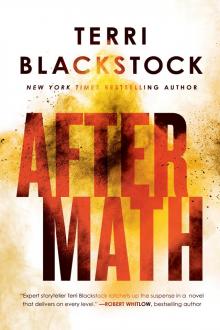 Aftermath
Aftermath Shadow of Doubt
Shadow of Doubt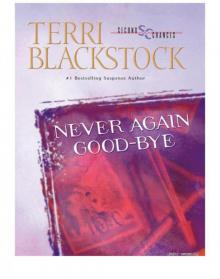 Second Chance - 05 - Never Again Good-Bye
Second Chance - 05 - Never Again Good-Bye Miracles
Miracles Broken Wings
Broken Wings the Cape Refuge (Cape Refuge Series Book 1)
the Cape Refuge (Cape Refuge Series Book 1) Shadow in Serenity
Shadow in Serenity Distortion (Moonlighters Series)
Distortion (Moonlighters Series) Second Chance - 02 - When Dreams Cross
Second Chance - 02 - When Dreams Cross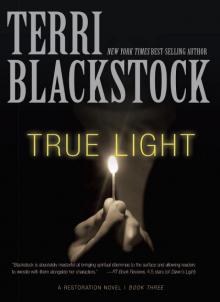 True Light
True Light Private Justice
Private Justice Last Light
Last Light Downfall (An Intervention Novel)
Downfall (An Intervention Novel) Distortion: Moonlighters Series: Book Two
Distortion: Moonlighters Series: Book Two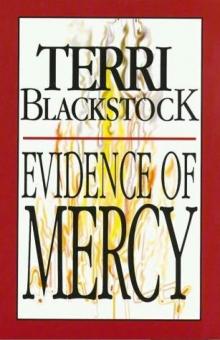 Evidence of Mercy
Evidence of Mercy If I Run
If I Run Southern Storm
Southern Storm Ulterior Motives
Ulterior Motives Emerald Windows
Emerald Windows River's Edge
River's Edge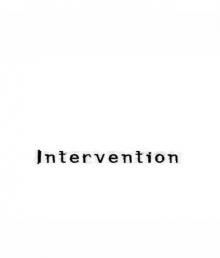 Intervention
Intervention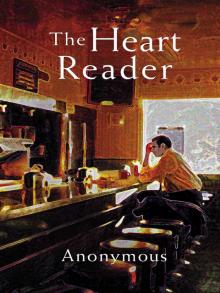 The Heart Reader
The Heart Reader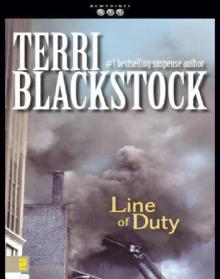 Line of Duty
Line of Duty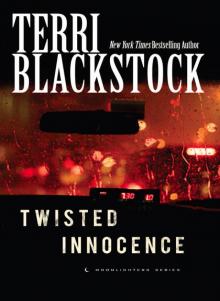 Twisted Innocence
Twisted Innocence When Dreams Cross
When Dreams Cross Downfall
Downfall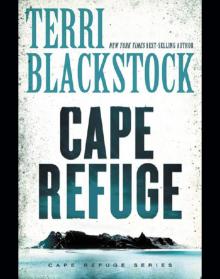 Cape Refuge
Cape Refuge Breaker's Reef
Breaker's Reef Night Light
Night Light Double Minds
Double Minds Justifiable Means
Justifiable Means Covenant Child
Covenant Child If I Live
If I Live If I'm Found
If I'm Found Vicious Cycle
Vicious Cycle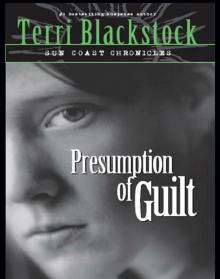 Presumption of Guilt
Presumption of Guilt Trial by Fire
Trial by Fire Word of Honor
Word of Honor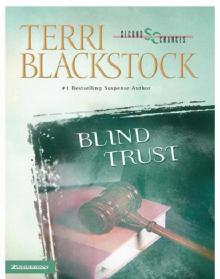 Second Chance - 03 - Blind Trust
Second Chance - 03 - Blind Trust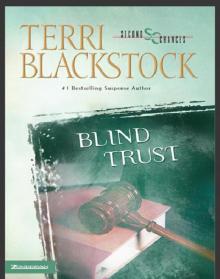 Blind Trust
Blind Trust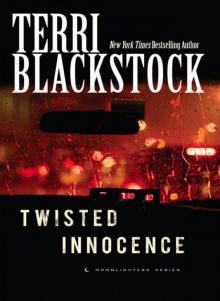 Twisted Innocence (Moonlighters Series Book 3)
Twisted Innocence (Moonlighters Series Book 3) Predator
Predator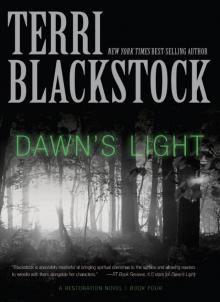 Dawn's Light
Dawn's Light Chance of Loving You
Chance of Loving You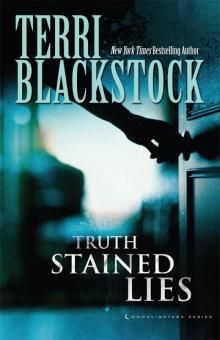 Truth-Stained Lies
Truth-Stained Lies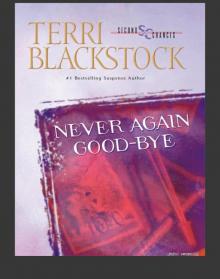 Never Again Good-Bye
Never Again Good-Bye Catching Christmas
Catching Christmas